This is a good time to recount my brother’s story. He was trampled by riot police in Montreal. He had health problems and was unable to get back to where he was before the incident. He died a few months later, within a month of having turned 72 years of age.
Video of the elderly man being pushed down and left by police in Buffalo on June 5th presents a vivid reminder of what happened to my brother, Bob. Ultimately, these two stories are not about police brutality and the tyrants who militarize the police. They represent our collective failure to cultivate a population that has the wherewithal and habits to create a just society. We are not raised to speak out in the face of injustice. We are trained to do as we are told.
Bob found his own way to being an activist. He had a love of history, read extensively, and became acutely aware of social and environmental injustices occurring around the world. When a demonstration was being staged to focus attention on a wrong being perpetrated, he would try to attend believing every voice mattered.
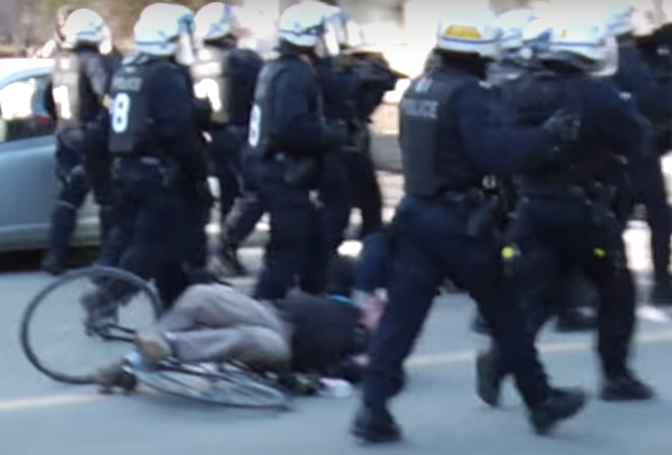
Montreal, April 3, 2014
As a younger man, he had twice been the Quebec veteran provincial road race cycling champion, but by the time he fell under the feet of police in Montreal, he was a physical wreck. He had two artificial knees, hardware up his spine from several major back operations, and a mechanical valve installed during open-heart surgery. He cycled to events because he had difficulty walking, but once he got himself propped up on his bike he could move around well. On his fateful day in Montreal, he was not confronting the police; he was trying to get out of their way. The signal had been given to disperse peaceful protesters, as was done for Trump’s photo-op in Washington on June 1st, and a wall of police advanced on the crowd. People quickly retreated leaving my brother alone in the street with too little time to get on his bike and get out of there. His injuries from the incident became infected. The bacteria collected around the metal of his mechanical valve, and he died suddenly in hospital some months later.
Another police encounter tells a different story. It was September 26, 2011 when Bob was in Ottawa to take part in the protest against the Keystone XL pipeline project. The organizers wanted to replicate a protest that took place in Washington at the end of August that year. It involved getting arrested for trespassing, but there was no appropriate place upon which to trespass. People in police services who respected the democratic right to peaceful protest solved the problem. Collaborating with organizers, they set up a barrier across the lawn in front of the Peace Tower and anyone who crossed it would be arrested. To make it easy to break the law, a makeshift structure was provided for people to climb over. When it was Bob’s turn to get arrested, he couldn’t manage the flimsy structure with his broken body. Seeing him struggle, the police quickly stepped up to take his arms and they helped him over. The image presents such an incredible contrast to the events of police brutality in Montreal and Washington – police kindly serving as accomplices to a senior citizen breaking the law as opposed to attacking peaceful protesters. It is perhaps one of the best stories of police entrapment and of respecting the right to peaceful protest.
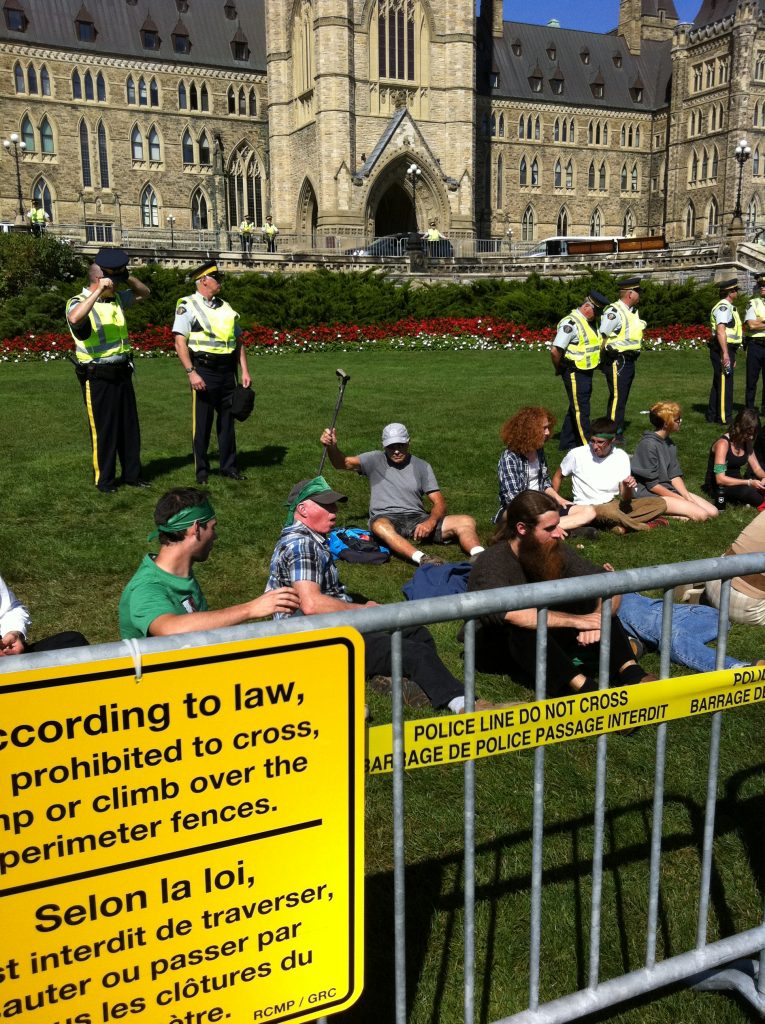
Bob in gray holding his cane in the lawbreakers’ detainment area.
Lately we have seen high school students take to the streets to protest climate change inaction. They have staged protests over gun laws, and in Ontario not long ago, they held walkouts to protest changes to sex education curriculum. Much could be said about whether or not these protests were allowed to happen because they aligned with the views of their elders. Much can also be said about how students portrayed themselves as deserving of having their voices heard. They gave the message that school authorities need not get nervous when students have the opportunity to express their concerns and are treated with respect.
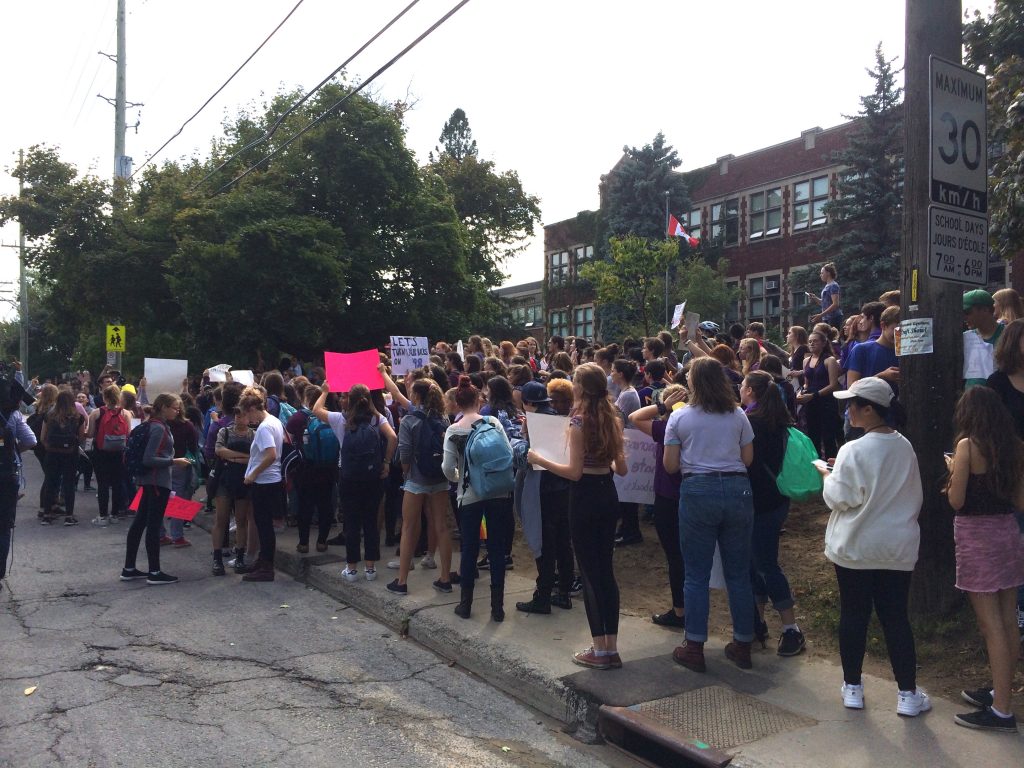
Ottawa September 21, 2018
School authorities fear losing control. If students become too assertive, the managers are apt to resort to manipulation and tokenism. If that fails, they can become heavy-handed. A big part of the problem is that the students’ concerns are almost always valid, but the authorities cannot provide valid responses, and so the lesson becomes one about obedience instead of justice. Teachers fear offending their superiors if they support the students; parents fear for their children’s futures if they do not do as they are told, and there we are. Fear is dictating our behaviour when the essence of democracy is that people do not live in fear of doing the right thing. Respecting the chain of command and toeing the line take precedence over justice.
The just society being demanded by today’s protestors is not possible without treating students as equals. Those who would have us believe that children and youth do not have the life experience or objectivity to be treated as equals do not understand equality. It is a view that breeds tyrants. If the current protests are to accomplish more than past ones, if enough is really to become enough, then schools have to change. We must demand that a determined, methodical transformation of public education to democratic practices begin immediately. The Ottawa Public Education Remake Initiative describes how to get started.
For those who wish to dig deeper into how our public schools are not “simply democracy in action,” Ron Miller’s book What are Schools For? (1997) is a stimulating read. He is powerful in how he conveys that in addition to some democratic elements, public education, as we know it, has arisen from “a host of elitist, nativist, moralist, and technocratic views that do not serve a democratic society well.” The publication date of the book does not speak to its relevance. Putting the book into context with today simply causes one to notice how deplorably public education is failing to reimagine itself.

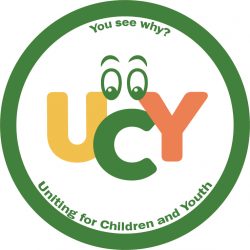
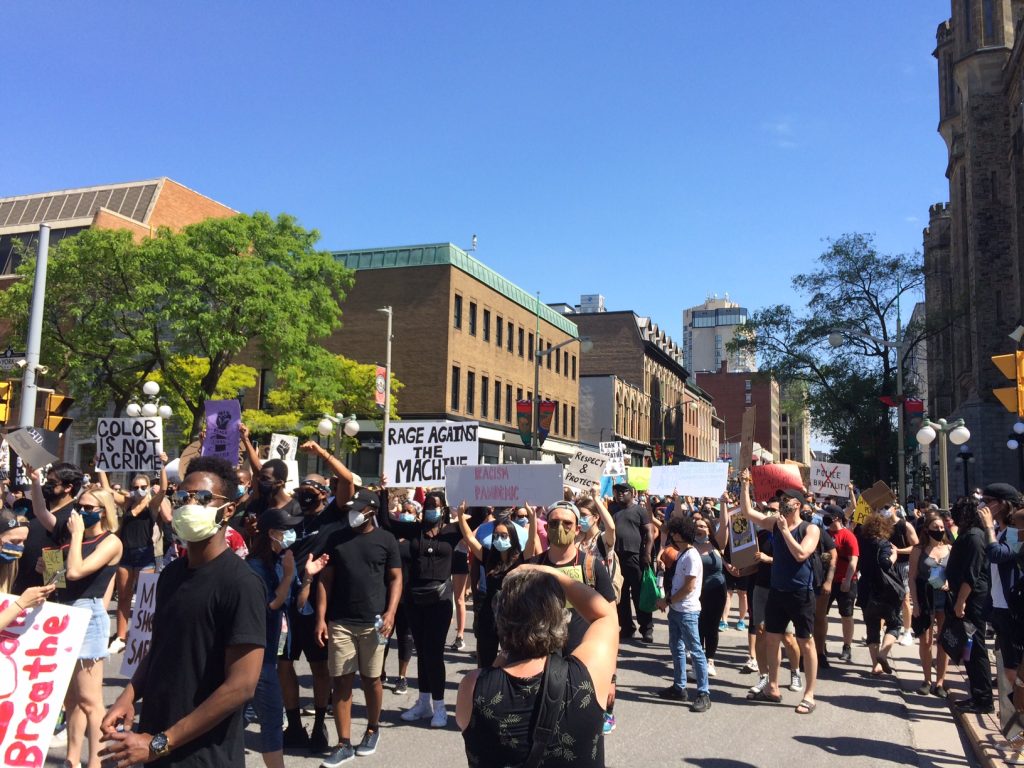
Hi Richard:
A great deal of this blog is inspired, even most of it. I did find the police incident regarding Bob and the bicycle in Montreal depressingly common in the current stories about policing. There are many difficulties around police mismanagement of their duties. Part of the problem is that police are asked to make too many decisions in highly stressful situations fro which they have too little training and aptitude. Policing today is an impossible job. We might all take a moment to try and re-define the role of policing in modern society. At the moment, they have little chance of success when their vast critical decision making must be made so quickly in too many different situations. So, I would greatly narrow the scope, responsibility and expectations of all policing. I might begin with he RCMP who are hopelessly asked to perform too many duties, with too few resources, all over Canada.
Of course, to reform our basic thoughts about policing will require us to re-imagine our entire social philosophy, conscience and attitudes toward each other.
On the issue of school structure and expectations, yes, fear of control loss is the imperative. As it is in most of society. To lessen that fundamental fear in all areas of life, will require a new trust in ourselves and each other. All goes in parallel with re-imagining policing. We must do it all.
Michael Wilson